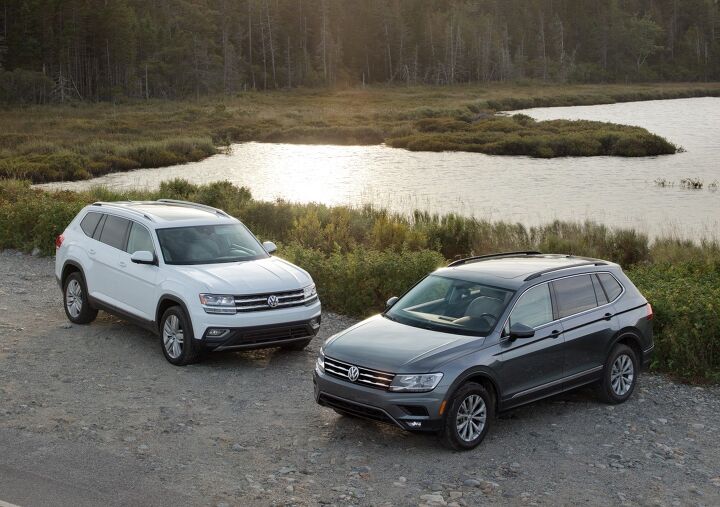Volkswagen Wants the World to Buy Like Americans

The world needs to adopt North America’s penchant for high-riding SUVs if Volkswagen has any hope of building a clean, green, safe future for your kids. That’s basically the message coming from the automaker, which wants 50 percent of its global product mix to be made up of crossovers and SUVs by 2025.
High-margin SUVs will bolster the brand’s business, the company says, helping bring in the cash needed to eventually take your internal combustion engine and steering wheel away.
It’s a similar product/planning strategy underway at BMW, which recently launched the massive X7 to help expand its line of electric cars. Judging by a flurry of model trademarks (X8, X9), Bimmer’s got other large, multi-cylinder vehicles on the way.
VW made its cargo-happy declaration at the overseas launch of the tiny T-Cross crossover, a Polo-based vehicle slotting below the T-Roc on the utility ladder.
“SUVs are becoming increasingly popular with our customers throughout the world,” said Jürgen Stackmann, the Volkswagen board member responsible for sales. “This is why we are consistently pursuing our current SUV offensive. It will be a key contribution to strengthening our core business so that we can invest the necessary billions of euros in mobility and autonomous driving. The T-Cross rounds off our SUV family in the rapidly growing small SUV market.”
The recent global launch of the larger, redesigned Tiguan led to boffo sales, while North American and Chinese customers now enjoy the identical three-row Atlas and Teramont, respectively. Europeans just received a new, range-topping Touareg. A new, smaller crossover is due in our market before too long, as is a sportier, two-row Atlas variant.
As it continues its SUV offensive on the global stage, the brand holds equally lofty expectations for its looming I.D. electric car line. VW hopes to sell 1 million EVs by 2025. The two product plans make for strange bedfellows, though they’re married by money. EVs aren’t known for their generous margins, and development costs are sky-high. Throwing a number of different-sized bodies onto the MQB platform will deliver the cash needed to get the I.D.s, later EVs, and futuristic self-driving vehicles off the ground, VW hopes.
In the U.S., utility vehicles made up 40.2 percent of Volkswagen’s September sales volume. Even the American market isn’t American enough for VW at this point.
[Image: Volkswagen of America]

More by Steph Willems
Latest Car Reviews
Read moreLatest Product Reviews
Read moreRecent Comments
- Haze3 The main advantages of this scheme would seem to be low/isolated pollution (single source NG) and high uptime. Electric is definitely better for net particulate at worker level and may also be preferred for long term maintenance.This said, the CA grid runs a little under 40% fossil fuel (pretty much all NG), so charging these trucks directly from the grid would have lower emissions than generating directly from 100% NG. It would also be more power efficient. However, it's likely that supply reliability and cost would be worse (this cuts out the power co). This is a LOT of charging.Overall efficiency should be equal to or a little worse than direct NG fueling, depending on NG generation process type. Should run 30-40% vs. 40% for direct NG fueling.
- Canam23 When I moved to France a little over two years ago, one of the first things I noticed is the French buy French... everything. Seven out of ten cars you see on the road are French. When you go to the Home Depot equivalent, almost all the products are French or European Union, even the food in the grocery stores is labeled as being produced in France. This probably isn't surprising from a country that makes its own airliners, fighter jets and submarines but coming from the US where so much is imported from outside and especially from China, this was a revelation. Does France have protective tariffs? Yes, but nothing over the top. The French are proud of their products and they enjoy their employment and the benefits they receive. They do sell a Chinese brand here, MG, and you get a bit more for your money, but not much.If Americans had the same attitudes as the French, there might be a lot more manufacturing jobs in the US.
- Fred Remember when "made in Japan" was cut? Face it people bought 10 year old Fiats made behind the iron curtain. People will always shop price, the rest be damned.
- FreedMike Wow, and here I was thinking the EV haters were raring to go out and buy one, and then this. Tragic.
- Jkross22 "Even with that positive survey response, potential buyers are still worried about privacy." - LOL, that's hilarious. I wonder if the survey takers stopped the survey to take a few selfies and upload them to the cloud (aka someone else's computer).


































Comments
Join the conversation
I would think that CUVs will eventually become more popular in the EU than in the US. My logic behind this is with the smaller footprinted EU vehicles a taller vehicle offering better interior space usage will become dominant.
“It will be a key contribution to strengthening our core business so that we can invest the necessary billions of euros in mobility and autonomous driving.” This is sorta like McDonald’s saying that they need fat goober-pantloads to swallow heaps of their heart-clogging slime-burgers in order to develop healthy, nutritious alternatives for later on.